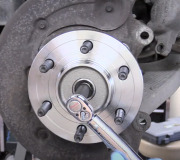Hi guys. Excuse me for butting into your conversation, but if you have the hub and bearing assembly, rather than the pressed-in bearing older Fords, Chryslers, and Hondas used, you absolutely can not tell which side is noisy by driving the vehicle. I ran into this problem many times.
With the pressed-in bearings, it was common to identify the noisy bearing, as you did, by turning slightly while driving. With the hub and bearing assembly, you can make the noise louder by turning right, swear the noise is coming from the left side, and it will be the right bearing. The good news is you do not have to destroy the assembly to remove it, as you did with the pressed-in style, so you can put the removed assembly on the other side.
The only way I found to identify the noisy bearing is to run the vehicle on a hoist and listen next to it with a stethoscope. You will hear a little rumbling from the suspect bearing, but then you'll hear a much louder buzzing noise from the bad one. You won't hear it without the stethoscope because there is no weight on it.
Another way to find the noisy bearing is through use of a "Chassis Ear". That is a set of six microphones, a switch box, and a pair of head phones. You clip the microphones to various suspect points, then switch between them and listen while driving. In this case, clip one to each spindle near the wheel bearings, and clip one to the differential. Newer models of this tool have four wireless microphones and two with wires. They are all wired on the older model. Most dealerships have this tool but many mechanics have never seen it or heard of it. It is also available from the tool truck guys like Mac, Matco, Snapon, and Cornwell.
Caradiodoc
Sunday, September 5th, 2010 AT 6:20 PM


